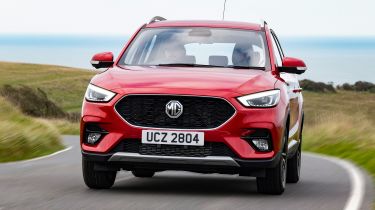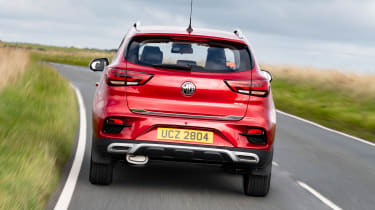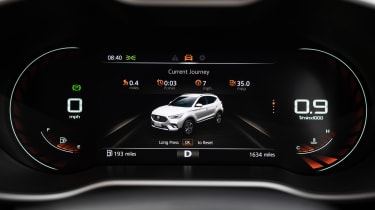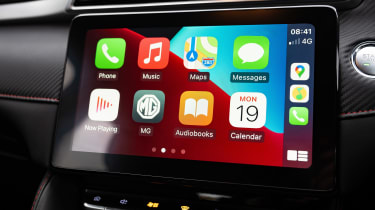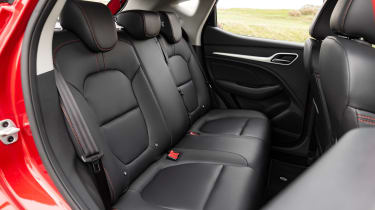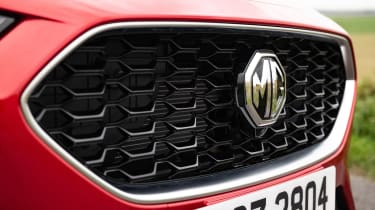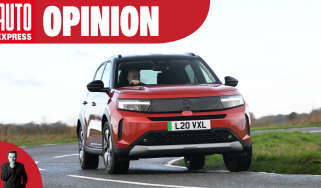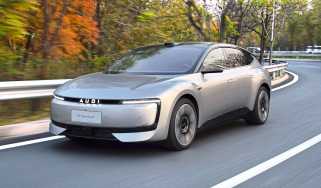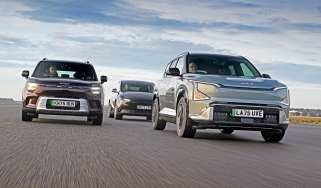MG ZS (2017-2024) review
The MG ZS struggles to compete head-on in the small SUV segment, but few serious flaws and value pricing mean it’s still worth a look

Just so you know, this is an older review of the 2017-2024 MG ZS. If you are interested in information about the latest MG ZS Hybrid, a used MG ZS, or news about the latest MG models, please follow the links provided.
Look at the competition, and it quickly becomes clear the MG ZS has a tough battle on its hands. The compact SUV sector is full to bursting with excellent rivals, and while the Chinese-built MG looks decent enough on paper, it lacks the visual and dynamic flair to really trouble the class leaders.
Despite this, buyers who want to jump on the SUV train but haven’t got the budget for a European, Japanese or Korean rival, may easily be tempted by what the ZS does offer at the price. It’s comfortable, decent looking and well-equipped, and the entry-level model especially looks like stonking value. Crash safety ratings could be better, however.
About the MG ZS
While the MG brand has a tremendous heritage in the UK thanks to its sporting exploits in the last century, it's taken a while for it to build a more contemporary presence. The ZS was introduced in 2017 as the manufacturer's attempt at catching up with the lucrative compact SUV/crossover trend – although the larger MG GS did arrive before it.
Used - available now
As well as its most obvious competitor the Nissan Juke, rivals include notably competent European models such as the Citroen C3 Aircross, Peugeot 2008, Renault Captur, SEAT Arona and the Vauxhall Crossland, while the Korean pair of the Kia Stonic and Hyundai Kona are also contenders. The budget-focused Dacia Duster offers similarly eye-catching value to the ZS but with a bit more of a traditional off-road 4x4 utility feel.
The front-wheel drive MG ZS is only available as a five-door model with just two trim levels to choose from. The entry-level Excite specification is well equipped and includes 17-inch alloy wheels, rear parking sensors and a 10.1-inch colour touchscreen with Apple CarPlay and Android Auto smartphone connectivity. Stepping up to the Exclusive model adds snazzier alloy wheels, along with luxuries such as integrated sat-nav, a 360-degree camera, leather-style upholstery and heated front seats.
Powertrain options are limited to a base 1.5-litre petrol four-cylinder with a five-speed manual gearbox, or a slightly peppier 1.0-litre three-cylinder petrol unit with the choice of a six-speed manual or a six-speed automatic transmission. MG also offers the ZS EV electric SUV, which is able to travel up to 273 miles on a single charge in Long Range form. The ZS EV gets its own SE and Trophy trim lines roughly equivalent to Excite and Exclusive. The entry-level SE gets that 360-degree camera, while both use a unique alloy wheel design.
Engines, performance and drive
Unlike MG models of old, the current crop don’t make too much of a pretence of being hugely fun to drive. The ZS is reasonably comfortable on the road, but there’s a lack of sophistication evident even though the suspension effectively soaks up the bumps and potholes that pockmark British roads. It feels more wallowy and less compliant and supple than the Citroen C3 Aircross, for example, and things get markedly worse if you try and make faster progress.
Push the car harder into a bend and excessive body roll becomes apparent fairly early, deterring the driver from pressing on. There’s also too much fore and aft pitching and diving, especially under braking, but for a driver who takes things gently this is unlikely to be too much of an issue.
The steering is relatively heavy in normal mode, but you can select Dynamic or Urban settings. The former adds weight but no more feel or responsiveness, while Urban usefully lightens the helm for town duty and is a worthwhile addition.
Engine noise is decently muted (and the ZS EV is naturally quieter still, with little motor whine) but again the Chinese made MG’s lack of sophistication is revealed by wind and road noise – it’s not too terrible, just not as good as rivals.
0-62mph acceleration and top speed
There are two petrol engine options only, and the entry-level is the 1.5-litre four-cylinder model. This engine is only available with a five-speed manual gearbox, and it drives the front wheels as the ZS has no 4x4 option. It’s a fairly old-school combination, and performance is pretty stodgy although the quoted 0-60mph time of 10.4 seconds doesn’t seem too bad on paper.
The pricier option is a three-cylinder direct injection turbocharged 1.0-litre developed in conjunction with General Motors. It comes with either a six-speed manual or a six-speed automatic gearbox, with the former taking 10.5 seconds from 0-62mph, and the latter 12.1 seconds. The 1.0-litre unit provides more torque than the 1.5-litre engine (160Nm vs 141Nm); this helps it feel peppier in the 50-70mph zone and makes for easier and safer overtaking.
The MG ZS EV is quicker than all the petrol alternatives, however. Interestingly, the base model has more power, producing 174bhp vs 154bhp, and its smaller battery pack means less weight to haul along. As a result it’ll reach 62mph from rest in 8 seconds flat, while the Long Range model will do the same benchmark sprint in 8.2 seconds.
MPG, CO2 and running costs
There’s no doubt the MG ZS is cheap to buy, and it should be reasonably cheap to run too, although it’s not exactly an economy star when you compare its efficiency to that of rivals.
The 1.0-litre three-cylinder engine is the more technically advanced option, and you might hope for better figures than it actually delivers. It only musters a best of 42.7mpg on the combined cycle using WLTP measures, while we’d have hoped for a little better to compete with key competitors. CO2 emissions from 149g/km don’t look great either.
But of course you’ll have to drive a long way before any economy disadvantages eat up the savings you’ve made in the showroom by opting for the MG instead of a European competitor. MG quotes the same overall economy figures for both the 1.0-litre and 1.5-litre manual models, at 42.7mpg with CO2 of 149g/km, while the 1.0-litre with the six-speed automatic transmission is actually a little less efficient, with combined WLTP economy of 39mpg, and CO2 emissions of 163g/km.
Electric range, battery and charging
If you go for the fully electric MG ZS EV, the 49kWh of usable battery capacity in the regular model allows for a WLTP combined driving range of 198 miles. A full charge from a standard 7.4kW home wallbox should take 8 hours, while a 10 to 80 per cent top-up from a public rapid charger could take as little as 38 minutes. The ZS EV Long Range has a quoted driving range of 273 miles thanks to its 72.6kWh battery. Fully replenishing that larger battery will take 10.5 hours from a 7.4kW wallbox, while a 100kW rapid charger should top up the battery from 10 to 80 per cent in 42 minutes.
Insurance groups
The lack of performance and cheap pricing mean the MG ZS should be cheap to insure, although some rivals offer lower insurance ratings. The 1.5-litre model is in group 15 (out of 50), while the 1.0-litre version is as little as group 10 in automatic form, and up to group 15 in higher trim levels. In comparison, the Renault Captur starts from group 12, while the cheapest Dacia Duster is in group 11. The ZS EV stretches to group 28 for a Long Range car in Trophy trim.
Depreciation
Residual values for the MG ZS are much improved. Our expert data predicts that the ZS 1.0-litre model should retain up to 58 per cent of its original list price over a typical three-year/36,000-mile ownership period, while the 1.5-litre version holds onto 62 per cent in some trim lines. The EV is likely to lose a little more money, retaining around 55 per cent of its value in the same period.
To get an accurate valuation on a specific model check out ourvfree car valuation tool...
Interior, design and technology
The MG ZS is fairly unremarkable from a design point of view, although it’s handsome enough in a generic sort of fashion. It represents quite a respectable air, and even the entry model avoids looking like a bargain basement offer. A facelift in 2020 introduced some cosmetic tweaks, with new 17-inch alloy wheels, a revised front bumper with LED headlights, a new radiator grille and an updated rear bumper with a skid-plate and faux exhaust tips.
The exterior revisions help the five-door model achieve a sleeker overall look, while the rakishly angled rear side windows and roofline that tapers towards the rear hatch help to mask the overall boxiness of the shape. Paint colours can make a big impact on a car like this, and MG offers three brighter hues for those who want to stand out a little more than the otherwise fairly standard choices: Hoxton Orange (not available on the EV), Dynamic Red or Battersea Blue are definitely better options than the other monochrome choices on offer.
Underneath, the ZS utilises a platform designed by MG for SUVs, although neither the engineering or electronics appear particularly exotic by the standard of more expensive rivals, but they serve their purpose at the ZS’s price.
The same can be said of the ZS’s interior, which is one of the best we’ve seen from the marque and certainly won’t disappoint at the price point. Material quality feel isn’t up to the level of Europe’s contenders, but the facia is pleasing to look at and feels durable and decently put together. The facelifted model now includes a fresh soft-touch dashboard and a centre armrest for the front seats. Opt for the ZS EV and other than the type of information displayed in front of you, and a small rotary drive selector rather than a manual shifter or automatic lever, there’s no real difference to the combustion-engined models.
Sat-nav, stereo and infotainment
The previous car’s eight-inch infotainment system has been ditched in favour of a new 10.1-inch unit, which also offers support for Apple CarPlay and Android Auto smartphone connectivity. It's definitely an upgrade over the previous system, the menus are straightforward enough and the graphics are clear, although we wish it responded to inputs quicker. Exclusive trim models add integrated sat-nav, a 360-degree parking camera and an upgraded six-speaker audio system.
Practicality, comfort and boot space
The MG ZS is very well suited to family life thanks to its boxy five-door design, and it’s a roomy place for five people and their luggage. There’s no seven-seat option or any other body configuration.
The driving position is good with lots of driver’s seat adjustment to accommodate all shapes, but while the steering wheel tilts, it doesn’t slide in and out for reach, which is disappointing. The seat is well bolstered and comfortable for long journeys, though, and five people can travel in reasonable comfort, although a middle passenger in the rear will be somewhat squeezed between the two main seats. Visibility from the driver’s seat is good, and the ZS has good cabin storage with large door pockets and cubbies around the passenger space.
Size
The MG ZS is a little bigger than most of its direct competitors, and measures 4,323mm long, 1,809mm wide and 1,620mm tall (1,625mm for the ZS EV). The Renault Captur is a little smaller all-round at 4,122mm, 1,778mm and 1,566mm, respectively. The shape of the C pillar means there’s quite a blind spot at the rear when reversing, so park sensors are a valuable addition to the spec.
Leg room, head room & passenger space
Leg and headroom is good for all four passengers in the primary seats, but the middle seat on the rear bench is on the narrow side. The transmission tunnel doesn’t intrude too heavily on legroom for the middle passenger, though.
Boot
The MG ZS has pretty generous boot space with 448 litres of luggage volume on offer – that’s 26 litres more than the Nissan Juke.
The MG’s rear seat splits and folds 60:40 when necessary, and with all the seats down, luggage volume goes up to 1,375 litres. Unfortunately, the seats don’t fold completely flat, which makes loading longer items potentially more awkward.
Towing
If you're prioritising towing capability, then you might want to look at other rivals, as the ZS is only rated to tow up to 500kg, whether in petrol or EV form.
Reliability and Safety
The cut-price nature of the MG ZS starts to make itself felt in a more significant fashion here, as clearly the safety aspects of the car have not been as well conceived or developed as many rivals.
The lack of any sort of automatic emergency braking (AEB) – or other systems designed to mitigate in accident scenarios – contributed to a low three-star score in the Euro NCAP Safety Assist category, but arguably more worryingly, the occupant safety scores look poor compared to rivals like the SEAT Arona. Where the ZS scores 71 per cent and 51 per cent for adult and child crash protection, the Arona scores 90 per cent and 80 per cent.
As a result of all this, the MG ZS Euro NCAP score of just three stars looks pretty weak. However, the ZS EV was tested separately in 2019 and achieved a full five-star rating, with much improved individual figures for adult and child safety.
The ZS finished 61st out of a list of 75 cars in our most recent Driver Power owner satisfaction survey, while MG, as a brand, placed 28th out of the 29 best manufacturers – only ahead of Fiat.
Warranty
MG offers a generous warranty on the ZS. It runs for seven years and up to 80,000 miles, which is just short of Kia’s seven-year, 100,000-mile cover. The warranty is transferable, too, so it can be passed onto a new owner if you sell.
Servicing
MGs service intervals are annually or at 15,000 miles, and you can buy service plans from dealers to help spread the cost.

